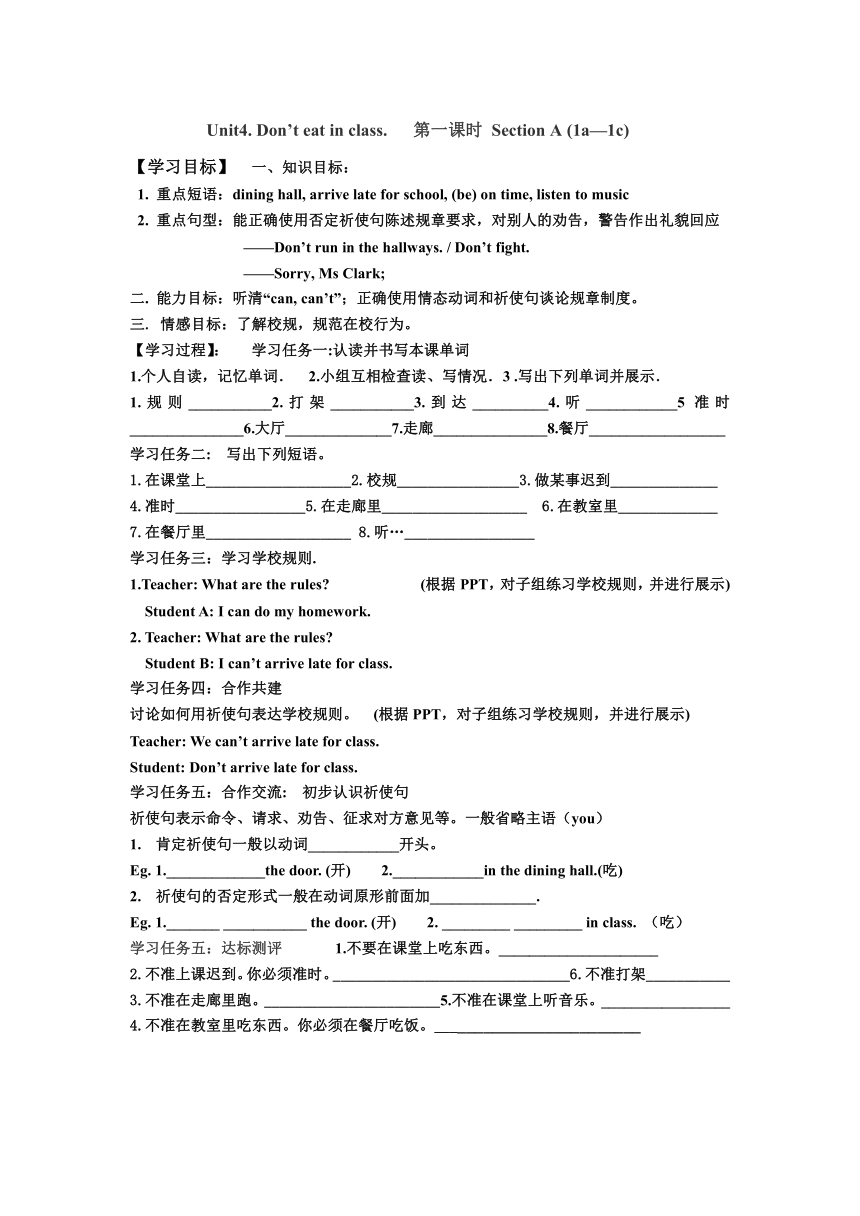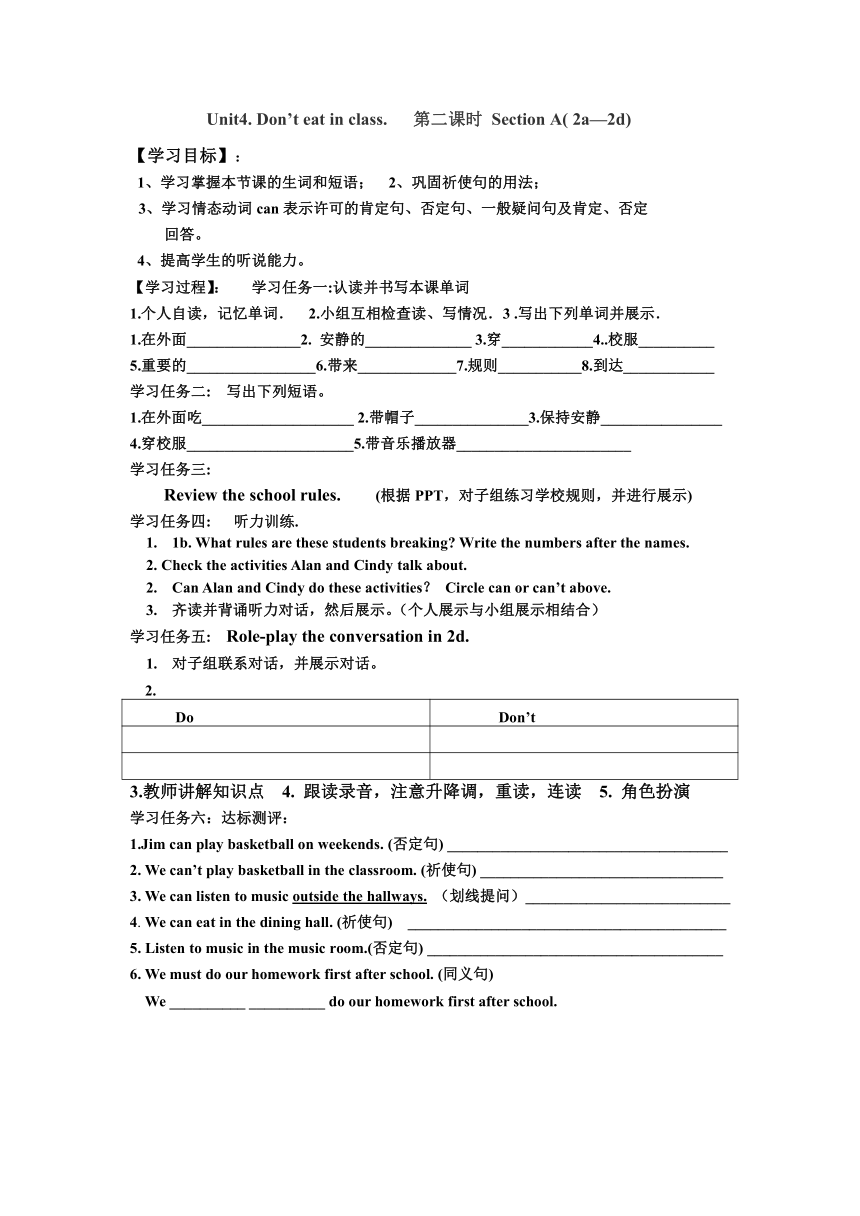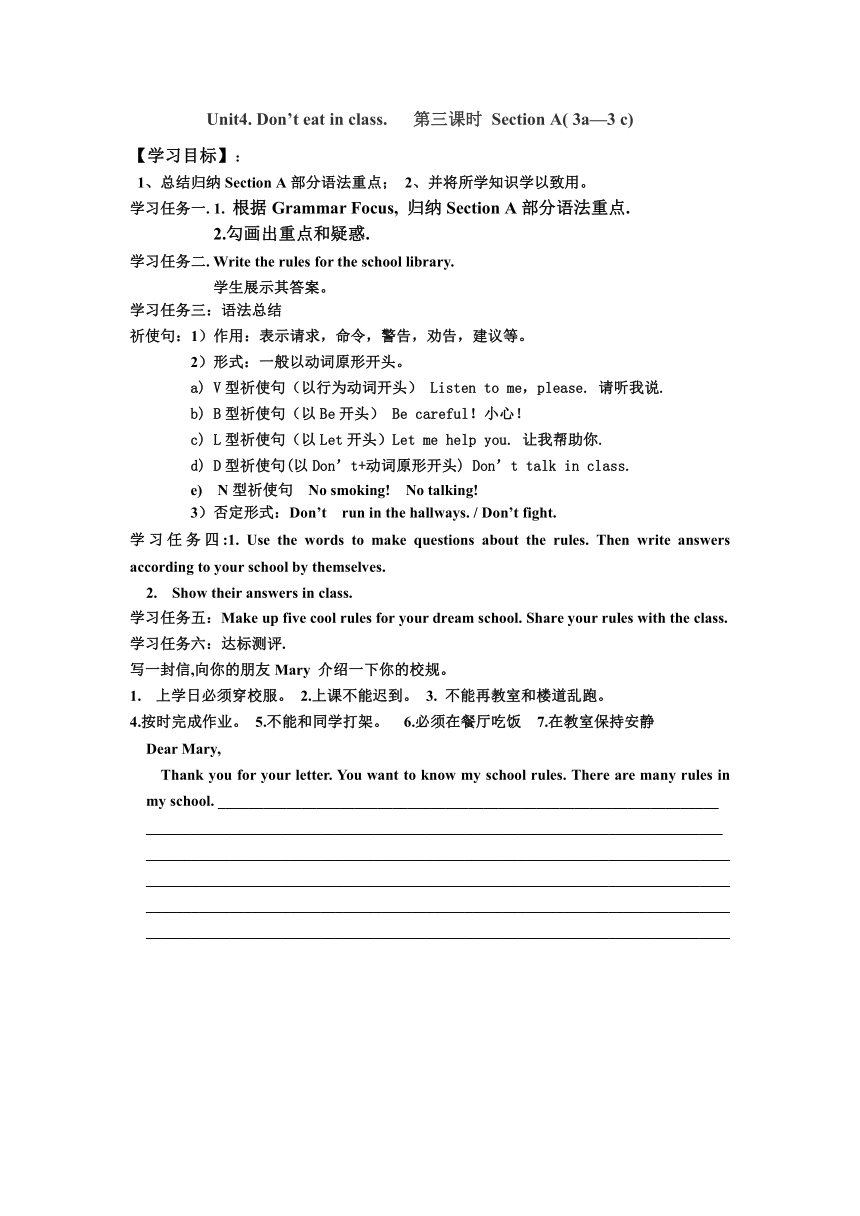Unit 4 Don’t eat in class. 导学案(5课时)
文档属性
| 名称 | Unit 4 Don’t eat in class. 导学案(5课时) |

|
|
| 格式 | zip | ||
| 文件大小 | 19.4KB | ||
| 资源类型 | 教案 | ||
| 版本资源 | 人教新目标(Go for it)版 | ||
| 科目 | 英语 | ||
| 更新时间 | 2015-04-13 00:00:00 | ||
图片预览



文档简介
Unit4. Don’t eat in class. 第一课时 Section A (1a—1c)
【学习目标】 一、知识目标:
1. 重点短语:dining hall, arrive late for school, (be) on time, listen to music
2. 重点句型:能正确使用否定祈使句陈述规章要求,对别人的劝告,警告作出礼貌回应——Don’t run in the hallways. / Don’t fight.
——Sorry, Ms Clark;
二. 能力目标:听清“can, can’t”;正确使用情态动词和祈使句谈论规章制度。
三. 情感目标:了解校规,规范在校行为。
【学习过程】: 学习任务一:认读并书写本课单词
1.个人自读,记忆单词. 2.小组互相检查读、写情况.3 .写出下列单词并展示.
1.规则___________2.打架___________3.到达__________4.听____________5准时_______________6.大厅______________7.走廊_______________8.餐厅__________________
学习任务二: 写出下列短语。
1.在课堂上___________________2.校规________________3.做某事迟到______________
4.准时_________________5.在走廊里___________________ 6.在教室里_____________
7.在餐厅里___________________ 8.听…_________________
学习任务三:学习学校规则.
1.Teacher: What are the rules (根据PPT,对子组练习学校规则,并进行展示)
Student A: I can do my homework.
2. Teacher: What are the rules
Student B: I can’t arrive late for class.
学习任务四:合作共建
讨论如何用祈使句表达学校规则。 (根据PPT,对子组练习学校规则,并进行展示)
Teacher: We can’t arrive late for class.
Student: Don’t arrive late for class.
学习任务五:合作交流: 初步认识祈使句
祈使句表示命令、请求、劝告、征求对方意见等。一般省略主语(you)
肯定祈使句一般以动词____________开头。
Eg. 1._____________the door. (开) 2.____________in the dining hall.(吃)
祈使句的否定形式一般在动词原形前面加______________.
Eg. 1._______ ___________ the door. (开) 2. _________ _________ in class. (吃)
学习任务五:达标测评 1.不要在课堂上吃东西。_____________________
2.不准上课迟到。你必须准时。_______________________________6.不准打架___________
3.不准在走廊里跑。_______________________5.不准在课堂上听音乐。_________________
4.不准在教室里吃东西。你必须在餐厅吃饭。________________________
Unit4. Don’t eat in class. 第二课时 Section A( 2a—2d)
【学习目标】:
1、学习掌握本节课的生词和短语; 2、巩固祈使句的用法;
3、学习情态动词can表示许可的肯定句、否定句、一般疑问句及肯定、否定
回答。
4、提高学生的听说能力。
【学习过程】: 学习任务一:认读并书写本课单词
1.个人自读,记忆单词. 2.小组互相检查读、写情况.3 .写出下列单词并展示.
1.在外面_______________2. 安静的______________ 3.穿____________4..校服__________
5.重要的_________________6.带来_____________7.规则___________8.到达____________
学习任务二: 写出下列短语。
1.在外面吃____________________ 2.带帽子_______________3.保持安静________________
4.穿校服______________________5.带音乐播放器_______________________
学习任务三:
Review the school rules. (根据PPT,对子组练习学校规则,并进行展示)
学习任务四: 听力训练.
1b. What rules are these students breaking Write the numbers after the names.
2. Check the activities Alan and Cindy talk about.
Can Alan and Cindy do these activities? Circle can or can’t above.
齐读并背诵听力对话,然后展示。(个人展示与小组展示相结合)
学习任务五: Role-play the conversation in 2d.
对子组联系对话,并展示对话。
2.
Do Don’t
3.教师讲解知识点 4. 跟读录音,注意升降调,重读,连读 5. 角色扮演
学习任务六:达标测评:
1.Jim can play basketball on weekends. (否定句) _____________________________________
2. We can’t play basketball in the classroom. (祈使句) ________________________________
3. We can listen to music outside the hallways. (划线提问)___________________________
4. We can eat in the dining hall. (祈使句) __________________________________________
5. Listen to music in the music room.(否定句) _______________________________________
6. We must do our homework first after school. (同义句)
We __________ __________ do our homework first after school.
Unit4. Don’t eat in class. 第三课时 Section A( 3a—3 c)
【学习目标】:
1、总结归纳Section A部分语法重点; 2、并将所学知识学以致用。
学习任务一. 1. 根据Grammar Focus, 归纳Section A部分语法重点.
2.勾画出重点和疑惑.
学习任务二. Write the rules for the school library.
学生展示其答案。
学习任务三:语法总结
祈使句:1)作用:表示请求,命令,警告,劝告,建议等。
2)形式:一般以动词原形开头。
a) V型祈使句(以行为动词开头) Listen to me,please. 请听我说.
b) B型祈使句(以Be开头) Be careful!小心!
c) L型祈使句(以Let开头)Let me help you. 让我帮助你.
d) D型祈使句(以Don’t+动词原形开头) Don’t talk in class.
e) N型祈使句 No smoking! No talking!
3)否定形式:Don’t run in the hallways. / Don’t fight.
学习任务四:1. Use the words to make questions about the rules. Then write answers according to your school by themselves.
Show their answers in class.
学习任务五:Make up five cool rules for your dream school. Share your rules with the class.
学习任务六:达标测评.
写一封信,向你的朋友Mary 介绍一下你的校规。
上学日必须穿校服。 2.上课不能迟到。 3. 不能再教室和楼道乱跑。
4.按时完成作业。 5.不能和同学打架。 6.必须在餐厅吃饭 7.在教室保持安静
Dear Mary,
Thank you for your letter. You want to know my school rules. There are many rules in my school. __________________________________________________________________
____________________________________________________________________________
____________________________________________________________________________________________________________________________________________________________________________________________________________________________________________________________________________________________________________________
Unit4. Don’t eat in class. 第四课时 Section B( 1a—1 c)
【学习目标】 1、学习谈论家规。
2、掌握句型:“ I must…” , “ I have to…” , “ I can /can’t…”
3、能听懂有关谈论规则的对话并进行自由交际。
学习任务一:认读并书写本课单词
1.个人自读,记忆单词. 2.小组互相检查读、写情况.3 .写出下列单词并展示.
1.在…之前_______________ 2.外出____________3.练习_______________4.碟___________
5.清洗餐具____________________6.外出娱乐________________
学习任务二: 写出下列短语。
1.看望朋友___________________2.打扫房间_____________________3.练习吉他____________________4. 帮助妈妈做早餐_________________________________
5.在学校的晚上_______________________6.每周六__________________________
7.晚饭前______________________8.放学后____________________
学习任务三: 听力训练
Listen and what things Dave can’t do and what things Dave can do.
Write when Dave has to follow the rules in the chart in 1b. Choose from the phrases in the box.
Read the rules in Dave’s house.
Talk about the rules in Dave’s house.
学习任务五: 达标测评.
Linda is an American girl. She is a good student. Every morning she gets up at 6:00. She has breakfast at home. ( 1 ) Then she wears her uniform and goes to school. She studies hard every day. ( 2 )她在餐厅吃中饭when she is at school. After school, ( 3 )she does her homework first, and then she cleans the room and ( 4 )帮助她妈妈做晚饭. Before she goes to bed, she usually reads some books. Then at 10:00p.m. she goes to bed. ( 5 )She thinks she is happy every day. What do you think
( 1 )
( 2 )
( 3 )
( 4 )
( 5 )
Unit4. Don’t eat in class. 第五课时 Section B( 2a—2c)
【学习目标】
1、学习谈论家规。2、学会使用句型:“ I must…” , “ I have to…” , “ I can /can’t…”
3、能阅读有关谈论规章的文章并完成练习.
学习任务一. 认读并书写本课单词
1.个人自读,记忆单词. 2.小组互相检查读、写情况.3 .写出下列单词并展示.
1.脏的_____________2.幸运____________3.厨房_____________4.遵循_____________
5.更多的____________6.记住________________7.吵闹的_____________8.严格的__________
9.放松_____________10.感受____________11.阅读______________
12.铺床_____________________13.对某人要求严格_______________________
14.遵守规则____________________
学习任务二: Free talk
T: When you are unhappy about something, who do you like to talk to
学习任务三: Read the letters.
1.Read the letters and underline the rules for Molly. Check the answers.
2. Discuss the difficulties you found in 2b. Try to understand the letters.
Molly family rules
can Can’t
4.Read the letters again and again.
5. 阅读第二封信,找出Dr. Know 的观点并划线。
学习任务四:达标测评。
Dear Dave,
I’m not happy. There are too many rules in my house. It isn’t fair. I have to get up at five o’clock every morning. I can’t arrive late for school. I have to be there at eight o’clock. I have to come back home after school because I have to do my homework. In the evening I can’t watch TV because I have to help my mother make dinner and wash the dishes. I have to go to bed before ten o’clock. On weekends, I have to stay at home on Saturday morning. I have to clean my room and wash my clothes by eleven o’clock. On Saturday afternoon, I have to go to the children’s palace to learn the piano. Do you have lots of rules Are they fair
Your friend,
Alice
( )1. Who is the letter from
A. Dave. B. Alice. C. Alice’s mother.
( )2. What time does Alice have to get up
A. Five o’clock. B. Eight o’clock. C. Ten o’clock.
( )3. What does Alice have to do on Saturday morning
A. Wash the dishes. B. Wash her clothes. C. Learn the piano.
( )4. Why does she go to the children’s palace
A. To play football. B. To learn math. C. To learn piano.
( )5. which rules is not mentioned( 提到) ?
Don’t arrive late for school. B. Help mom make dinner
C. Listen to music on school nights.
D.Clean the room on Saturday morning.
【学习目标】 一、知识目标:
1. 重点短语:dining hall, arrive late for school, (be) on time, listen to music
2. 重点句型:能正确使用否定祈使句陈述规章要求,对别人的劝告,警告作出礼貌回应——Don’t run in the hallways. / Don’t fight.
——Sorry, Ms Clark;
二. 能力目标:听清“can, can’t”;正确使用情态动词和祈使句谈论规章制度。
三. 情感目标:了解校规,规范在校行为。
【学习过程】: 学习任务一:认读并书写本课单词
1.个人自读,记忆单词. 2.小组互相检查读、写情况.3 .写出下列单词并展示.
1.规则___________2.打架___________3.到达__________4.听____________5准时_______________6.大厅______________7.走廊_______________8.餐厅__________________
学习任务二: 写出下列短语。
1.在课堂上___________________2.校规________________3.做某事迟到______________
4.准时_________________5.在走廊里___________________ 6.在教室里_____________
7.在餐厅里___________________ 8.听…_________________
学习任务三:学习学校规则.
1.Teacher: What are the rules (根据PPT,对子组练习学校规则,并进行展示)
Student A: I can do my homework.
2. Teacher: What are the rules
Student B: I can’t arrive late for class.
学习任务四:合作共建
讨论如何用祈使句表达学校规则。 (根据PPT,对子组练习学校规则,并进行展示)
Teacher: We can’t arrive late for class.
Student: Don’t arrive late for class.
学习任务五:合作交流: 初步认识祈使句
祈使句表示命令、请求、劝告、征求对方意见等。一般省略主语(you)
肯定祈使句一般以动词____________开头。
Eg. 1._____________the door. (开) 2.____________in the dining hall.(吃)
祈使句的否定形式一般在动词原形前面加______________.
Eg. 1._______ ___________ the door. (开) 2. _________ _________ in class. (吃)
学习任务五:达标测评 1.不要在课堂上吃东西。_____________________
2.不准上课迟到。你必须准时。_______________________________6.不准打架___________
3.不准在走廊里跑。_______________________5.不准在课堂上听音乐。_________________
4.不准在教室里吃东西。你必须在餐厅吃饭。________________________
Unit4. Don’t eat in class. 第二课时 Section A( 2a—2d)
【学习目标】:
1、学习掌握本节课的生词和短语; 2、巩固祈使句的用法;
3、学习情态动词can表示许可的肯定句、否定句、一般疑问句及肯定、否定
回答。
4、提高学生的听说能力。
【学习过程】: 学习任务一:认读并书写本课单词
1.个人自读,记忆单词. 2.小组互相检查读、写情况.3 .写出下列单词并展示.
1.在外面_______________2. 安静的______________ 3.穿____________4..校服__________
5.重要的_________________6.带来_____________7.规则___________8.到达____________
学习任务二: 写出下列短语。
1.在外面吃____________________ 2.带帽子_______________3.保持安静________________
4.穿校服______________________5.带音乐播放器_______________________
学习任务三:
Review the school rules. (根据PPT,对子组练习学校规则,并进行展示)
学习任务四: 听力训练.
1b. What rules are these students breaking Write the numbers after the names.
2. Check the activities Alan and Cindy talk about.
Can Alan and Cindy do these activities? Circle can or can’t above.
齐读并背诵听力对话,然后展示。(个人展示与小组展示相结合)
学习任务五: Role-play the conversation in 2d.
对子组联系对话,并展示对话。
2.
Do Don’t
3.教师讲解知识点 4. 跟读录音,注意升降调,重读,连读 5. 角色扮演
学习任务六:达标测评:
1.Jim can play basketball on weekends. (否定句) _____________________________________
2. We can’t play basketball in the classroom. (祈使句) ________________________________
3. We can listen to music outside the hallways. (划线提问)___________________________
4. We can eat in the dining hall. (祈使句) __________________________________________
5. Listen to music in the music room.(否定句) _______________________________________
6. We must do our homework first after school. (同义句)
We __________ __________ do our homework first after school.
Unit4. Don’t eat in class. 第三课时 Section A( 3a—3 c)
【学习目标】:
1、总结归纳Section A部分语法重点; 2、并将所学知识学以致用。
学习任务一. 1. 根据Grammar Focus, 归纳Section A部分语法重点.
2.勾画出重点和疑惑.
学习任务二. Write the rules for the school library.
学生展示其答案。
学习任务三:语法总结
祈使句:1)作用:表示请求,命令,警告,劝告,建议等。
2)形式:一般以动词原形开头。
a) V型祈使句(以行为动词开头) Listen to me,please. 请听我说.
b) B型祈使句(以Be开头) Be careful!小心!
c) L型祈使句(以Let开头)Let me help you. 让我帮助你.
d) D型祈使句(以Don’t+动词原形开头) Don’t talk in class.
e) N型祈使句 No smoking! No talking!
3)否定形式:Don’t run in the hallways. / Don’t fight.
学习任务四:1. Use the words to make questions about the rules. Then write answers according to your school by themselves.
Show their answers in class.
学习任务五:Make up five cool rules for your dream school. Share your rules with the class.
学习任务六:达标测评.
写一封信,向你的朋友Mary 介绍一下你的校规。
上学日必须穿校服。 2.上课不能迟到。 3. 不能再教室和楼道乱跑。
4.按时完成作业。 5.不能和同学打架。 6.必须在餐厅吃饭 7.在教室保持安静
Dear Mary,
Thank you for your letter. You want to know my school rules. There are many rules in my school. __________________________________________________________________
____________________________________________________________________________
____________________________________________________________________________________________________________________________________________________________________________________________________________________________________________________________________________________________________________________
Unit4. Don’t eat in class. 第四课时 Section B( 1a—1 c)
【学习目标】 1、学习谈论家规。
2、掌握句型:“ I must…” , “ I have to…” , “ I can /can’t…”
3、能听懂有关谈论规则的对话并进行自由交际。
学习任务一:认读并书写本课单词
1.个人自读,记忆单词. 2.小组互相检查读、写情况.3 .写出下列单词并展示.
1.在…之前_______________ 2.外出____________3.练习_______________4.碟___________
5.清洗餐具____________________6.外出娱乐________________
学习任务二: 写出下列短语。
1.看望朋友___________________2.打扫房间_____________________3.练习吉他____________________4. 帮助妈妈做早餐_________________________________
5.在学校的晚上_______________________6.每周六__________________________
7.晚饭前______________________8.放学后____________________
学习任务三: 听力训练
Listen and what things Dave can’t do and what things Dave can do.
Write when Dave has to follow the rules in the chart in 1b. Choose from the phrases in the box.
Read the rules in Dave’s house.
Talk about the rules in Dave’s house.
学习任务五: 达标测评.
Linda is an American girl. She is a good student. Every morning she gets up at 6:00. She has breakfast at home. ( 1 ) Then she wears her uniform and goes to school. She studies hard every day. ( 2 )她在餐厅吃中饭when she is at school. After school, ( 3 )she does her homework first, and then she cleans the room and ( 4 )帮助她妈妈做晚饭. Before she goes to bed, she usually reads some books. Then at 10:00p.m. she goes to bed. ( 5 )She thinks she is happy every day. What do you think
( 1 )
( 2 )
( 3 )
( 4 )
( 5 )
Unit4. Don’t eat in class. 第五课时 Section B( 2a—2c)
【学习目标】
1、学习谈论家规。2、学会使用句型:“ I must…” , “ I have to…” , “ I can /can’t…”
3、能阅读有关谈论规章的文章并完成练习.
学习任务一. 认读并书写本课单词
1.个人自读,记忆单词. 2.小组互相检查读、写情况.3 .写出下列单词并展示.
1.脏的_____________2.幸运____________3.厨房_____________4.遵循_____________
5.更多的____________6.记住________________7.吵闹的_____________8.严格的__________
9.放松_____________10.感受____________11.阅读______________
12.铺床_____________________13.对某人要求严格_______________________
14.遵守规则____________________
学习任务二: Free talk
T: When you are unhappy about something, who do you like to talk to
学习任务三: Read the letters.
1.Read the letters and underline the rules for Molly. Check the answers.
2. Discuss the difficulties you found in 2b. Try to understand the letters.
Molly family rules
can Can’t
4.Read the letters again and again.
5. 阅读第二封信,找出Dr. Know 的观点并划线。
学习任务四:达标测评。
Dear Dave,
I’m not happy. There are too many rules in my house. It isn’t fair. I have to get up at five o’clock every morning. I can’t arrive late for school. I have to be there at eight o’clock. I have to come back home after school because I have to do my homework. In the evening I can’t watch TV because I have to help my mother make dinner and wash the dishes. I have to go to bed before ten o’clock. On weekends, I have to stay at home on Saturday morning. I have to clean my room and wash my clothes by eleven o’clock. On Saturday afternoon, I have to go to the children’s palace to learn the piano. Do you have lots of rules Are they fair
Your friend,
Alice
( )1. Who is the letter from
A. Dave. B. Alice. C. Alice’s mother.
( )2. What time does Alice have to get up
A. Five o’clock. B. Eight o’clock. C. Ten o’clock.
( )3. What does Alice have to do on Saturday morning
A. Wash the dishes. B. Wash her clothes. C. Learn the piano.
( )4. Why does she go to the children’s palace
A. To play football. B. To learn math. C. To learn piano.
( )5. which rules is not mentioned( 提到) ?
Don’t arrive late for school. B. Help mom make dinner
C. Listen to music on school nights.
D.Clean the room on Saturday morning.
同课章节目录
- Unit 1 Can you play the guitar?
- Section A
- Section B
- Unit 2 What time do you go to school?
- Section A
- Section B
- Unit 3 How do you get to school?
- Section A
- Section B
- Unit 4 Don't eat in class.
- Section A
- Section B
- Unit 5 Why do you like pandas?
- Section A
- Section B
- Unit 6 I'm watching TV.
- Section A
- Section B
- Review of Units 1-6
- Unit 7 It's raining!
- Section A
- Section B
- Unit 8 Is there a post office near here?
- Section A
- Section B
- Unit 9 What does he look like?
- Section A
- Section B
- Unit 10 I'd like some noodles.
- Section A
- Section B
- Unit 11 How was your school trip?
- Section A
- Section B
- Unit 12 What did you do last weekend?
- Section A
- Section B
